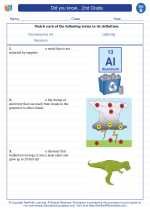What is a Cell?
A cell is the basic structural and functional unit of all living organisms. It is the smallest unit of life that can replicate independently, and all living things are composed of one or more cells.
Types of Cells
There are two main types of cells: prokaryotic cells and eukaryotic cells.
Prokaryotic Cells
Prokaryotic cells are simple cells that do not have a true nucleus or membrane-bound organelles. They are typically found in single-celled organisms, such as bacteria.
Eukaryotic Cells
Eukaryotic cells are more complex cells that have a true nucleus and membrane-bound organelles. They are found in plants, animals, fungi, and protists.
Parts of a Cell
Cells contain various structures called organelles, each with specific functions. Some of the important organelles include:
- Nucleus: Controls the cell's activities and contains genetic material
- Cytoplasm: Gel-like substance that fills the cell and contains organelles
- Cell Membrane: Outer boundary of the cell that regulates what enters and exits the cell
- Mitochondria: Powerhouse of the cell, where energy is produced
- Endoplasmic Reticulum: Network of membranes involved in protein and lipid synthesis
- Golgi Apparatus: Modifies, sorts, and packages proteins for storage or secretion
- Chloroplasts (in plant cells): Site of photosynthesis
- Cell Wall (in plant cells): Provides structure and support
Cell Functions
Cells carry out various functions to support life, including:
- Metabolism: Chemical reactions that provide energy and build and repair cell structures
- Growth and Reproduction: Cells grow and divide to produce new cells
- Response to Stimuli: Cells can respond to changes in their environment
- Homeostasis: Cells maintain a stable internal environment
Study Guide
Here are some key points to remember when studying cells:
- What are the two main types of cells?
- List at least five organelles and their functions.
- What is the function of the cell membrane?
- What are the main functions of cells?
- Give an example of a prokaryotic organism and a eukaryotic organism.
[Cell] Related Worksheets and Study Guides:
.◂Science Worksheets and Study Guides Second Grade. Did you know... 2nd Grade

 Worksheet/Answer key
Worksheet/Answer key
 Worksheet/Answer key
Worksheet/Answer key
 Worksheet/Answer key
Worksheet/Answer key
 Vocabulary/Answer key
Vocabulary/Answer key
